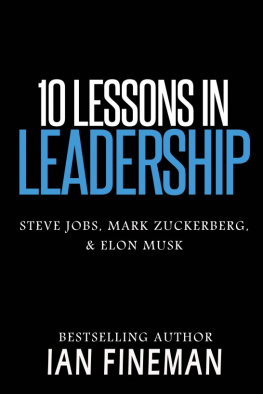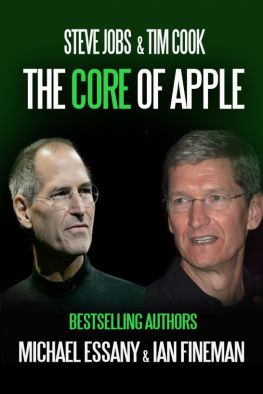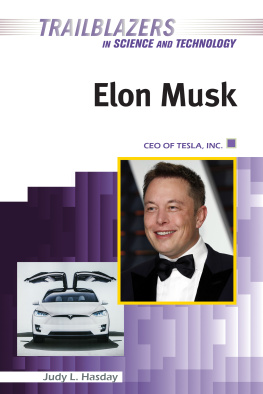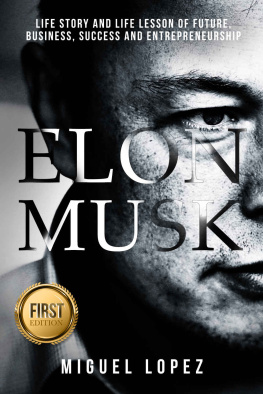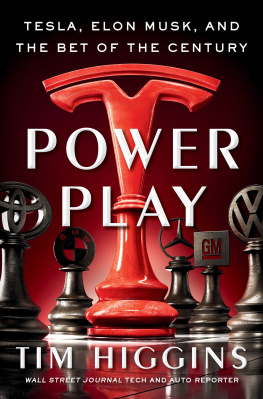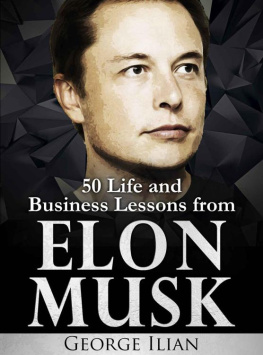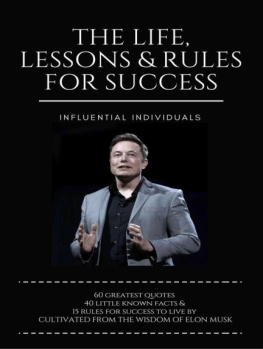10 Lessons in Leadership: Steve Jobs, MarkZuckerberg, Elon Musk
By Ian Fineman
Disclaimer
2015 Sports EntertainmentPublishing. All Rights Reserved worldwide. May not be copied ordistributed without prior written permission from theauthor.
This eBook is not affiliatedwith or endorsed by Apple, Steve Jobs, Mark Zuckerberg, Facebook,Elon Musk, Tesla, or any representatives thereof.
All information contained inthis eBook has been obtained by exclusive interviews, onlineresearch, and information freely available in the publicdomain.
This eBook providesinformation that you read and use at your own risk.
Steve Jobs: 10 Lessons in Leadership
Introduction
On October 5th, 2011, theworld lost one of its greatest innovators, inventors, and inspiredartists - Apple co-founder and tech visionary SteveJobs.
But as the world mourned theloss, it also collectively opened its eyes to the extraordinarylife and lessons imparted from his 56 years.
Within three weeks of hispassing, the official Steve Jobs biography by Walter Isaacson waspublished. But since then, as more details of Steve Jobs' personaland professional lives emerged, it became evident that future andpotentially more in-depth works about Jobs will follow.
Although many have attemptedto decode and decipher the lessons for success taught by SteveJobs' life, it is obvious from the man's own words that no such"lessons for success" really exist. What does exist, however, is acollection of lessons in leadership that Jobs' life provided. Andauspiciously for those who seek to learn from his magic, its onlythrough leadership on a personal and professional level thatsuccess can be obtained.
In the months that followedhis passing, unprecedented insight emerged with regard to theexperiences, mistakes, and successes that defined Steve Jobs life.The following pages present the philosophies and values as preachedand practiced by Jobs throughout his career, though only some havebeen well-known until now.
These are the ten supremelessons in leadership as exemplified by the incomparable life andlegacy of Steve Jobs.
Lesson 1: Wait ForNothing
There's only one thing inlife that you should enjoy waiting for. And that's for the rest ofthe world to catch up to your thinking.
When Steve Jobs was a youngman, his passion for technology and building things had begun toemerge. At one point in his youth, he wanted to build something butlacked a particular component of the required equipment.
While just twelve years ofage, Steve Jobs ventured to build a frequency counter. How did hedo it? He certainly didn't wait until he was older and had accessto the mature tools and resources of a man attempting a similarfeat. Instead, the boy looked up the phone number to Bill Hewlett,the founder of HP.
Steve Jobs called him toinquire about getting parts.
That takes loads of gumptionand heaps of impatience - two essential elements in Steve Jobs'success story. He was as a man that which he was as a boy - arestless spirit, eager to achieve, and unwilling towait.
Those who wait or simply gowith the flow, Jobs warned, could never be ahead of their time. Andthe most common trait among leaders across any field in anyindustry is foresight.
"The story of Steve Jobsboils down to this," says New York Times columnist David Pogue,"Dont go with the flow. Steve Jobs refused to go with the flow. Ifhe saw something that could be made better, smarter or morebeautiful, nothing else mattered. Not internal politics, noteconomic convention, not social graces. Apple has attained itscurrent astonishing levels of influence and success because itsnimble. Its incredibly focused. Its had stunningly few flops. Andthats because Mr. Jobs didnt buy into focus groups, groupthink ordecision by committee. At its core, Apple existed to execute thevisions in his brain. He oversaw every button, every corner, everychime. He lost sleep over the fonts in the menus, the cardboard ofthe packaging, the color of the power cord."
"Thats just not how thingsare done," Pogue adds. "Often, his laser focus flew in the face ofscreamingly obvious common sense. He wanted to open a chain ofretail stores after the failure of Gateways chain had clearlydemonstrated that the concept was doomed. He wanted to sell asmartphone that had no keyboard, when physical keys were preciselywhat had made the BlackBerry the most popular smartphone at thetime. Over and over again, he took away our comfy blankets. He tookaway our floppy drives, our dial-up modems, our camcorder jacks,our non-glossy screens, our Flash, our DVD drives, our removablelaptop batteries. How could he do that? Youre supposed to addfeatures, not take them away, Steve! Thats just notdone!"
Steve Jobs never did thingsthe way they had already been done. He did things the way they weresupposed to be done in a smarter, more advanced fashion.
"The thing that drives meand my colleagues, Jobs once said, is that you see something verycompelling to you, and you don't quite know how to get it, but youknow, sometimes intuitively, it's within your grasp. And it's worthputting in years of your life to make it come intoexistence.
Avoiding The Predicament ofThe Present
"Too often companies can gettrapped in the present," says Chris Dumont of the Financial Edge,"pumping out products with no inspiration. A few examples: In 1998the first iMac came with no floppy disk drive whereas every othercomputer manufacturer had still included them at that time. Therelease of the iPhone did not have a keyboard whereas theBlackberry, the most popular smartphone at the time, had one. Italso did not include flash as Jobs saw HTML 5 as the future. Nowwith the iPad, it promises to be the computer for everyone that theoriginal Mac aspired to be. Through all of these decisions and morethere was backlash, but in the end people eventually came aroundand benefited from this forward thinking. The world would be moreinnovative if more companies had the same focus."
Steve Jobs didn't wait forthe masses to demand change. He focused on the products andtechnologies that he perceived to be in need of reworking,reinventing, and reintroduction.
The repeated determinationto never wait for the so-called "right time" is, without question,one of the hallmarks of Steve Jobs' career and one of the mosteducational cornerstones of his legacy.
Lesson 2: The Details Don'tMatter... At First
Steve Jobs has beencelebrated and playfully chided as an innovator obsessed with eventhe most miniscule of details.
"Steve Jobs didnt justbring Apple computers, music players, and phones to the world,"says David Gewirtz of ZDNet. "What Steve Jobs brought was elegance,discipline, crisp design, and a forceful sense of right and wrong.Steve knew. He just knew what he wanted. He knew what would beright and what would have been right for any other technologyexecutive, but wouldnt meet his standards. Steve set the bar. Itsnot just that Apple eventually became a towering success, and noteven that other technology vendors followed his lead. Its thatSteve set the bar for excellence in product design andexecution."
He was, without question, atireless perfectionist
On what was shaping up to bean otherwise largely nondescript Sunday morning in January 2008,Vic Gundotra, Senior Vice-President of Social Business for Google,received a phone call Steve Jobs.
"Vic, can you call me athome?" Jobs said in the voice mail to Gundotra. "I have somethingurgent to discuss."
Before I even reached mycar, I called Steve Jobs back, Gundotra remembers. I wasresponsible for all mobile applications at Google, and in thatrole, had regular dealings with Steve. It was one of the perks ofthe job.
"So Vic, we have an urgentissue, one that I need addressed right away, Jobs said, flutteringhis words in obvious anticipation to resolve his crisis. I'vealready assigned someone from my team to help you, and I hope youcan fix this tomorrow. I've been looking at the Google logo on theiPhone and I'm not happy with the icon. The second O in Googledoesn't have the right yellow gradient. It's just wrong and I'mgoing to have Greg fix it tomorrow. Is that okay withyou?"

